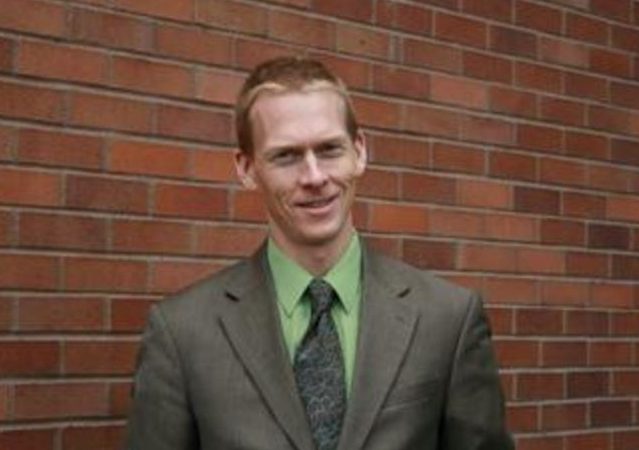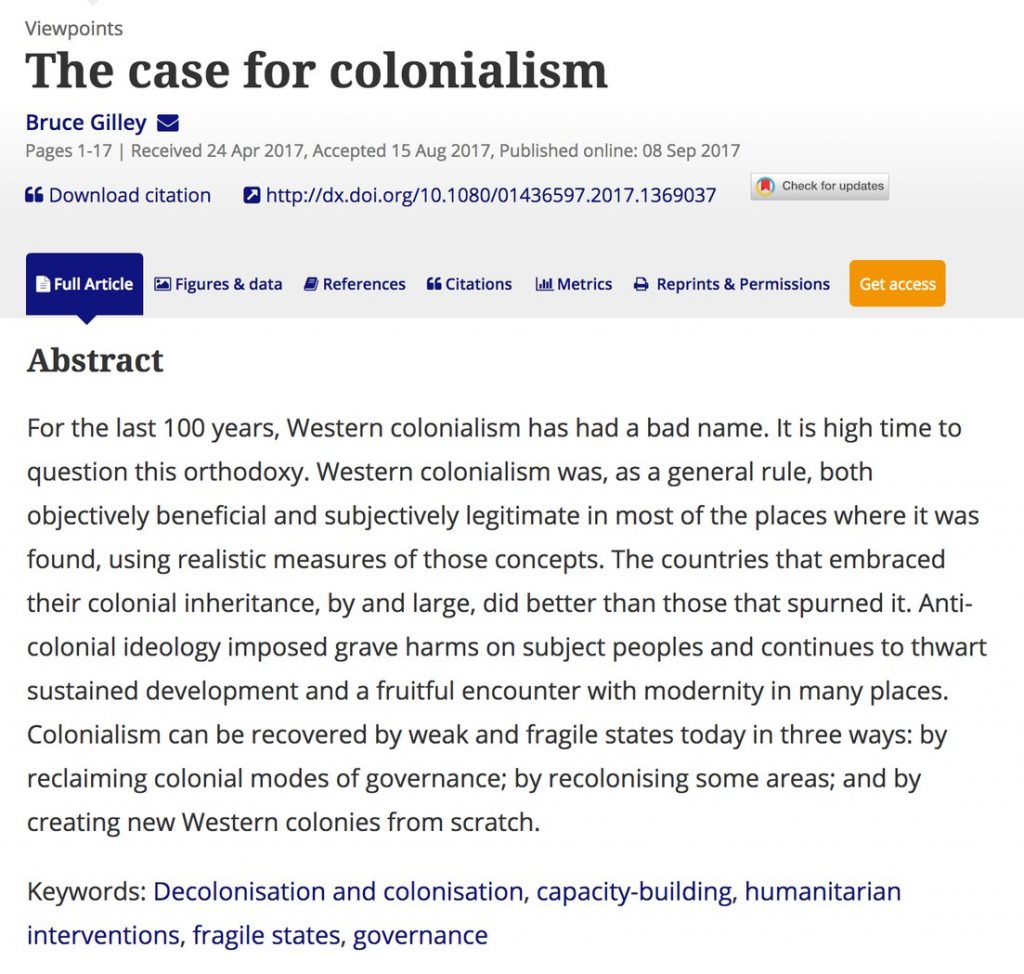Academic Antifa: Journal Removes Colonialism Article After “Credible Threats of Personal Violence”

In August 2017, Professor Bruce Gilley of Portland State University published “The Case for Colonialism” (original link removed, article available here) in Third World Quarterly.
This is the article’s abstract:
For the last 100 years, Western colonialism has had a bad name. It is high time to question this orthodoxy. Western colonialism was, as a general rule, both objectively beneficial and subjectively legitimate in most of the places where it was found, using realistic measures of those concepts. The countries that embraced their colonial inheritance, by and large, did better than those that spurned it. Anti-colonial ideology imposed grave harms on subject peoples and continues to thwart sustained development and a fruitful encounter with modernity in many places. Colonialism can be recovered by weak and fragile states today in three ways: by reclaiming colonial modes of governance; by recolonising some areas; and by creating new Western colonies from scratch.
Protests, Calls for Retraction (and more), and Resignations
What ensued was a full-blown academic firestorm, which we covered in several prior posts:
- Third World Quarterly publishes “The Case for Colonialism” leading to censorship demands
- Scholar Withdraws Article, “The Case for Colonialism” After Social Media and Professional Attacks
- Colonialism Article Sets off Firestorm in Academia
Gilley’s critics were so outraged that they called for the article’s retraction, as well as for removal of the journal editors and a public apology. These demands were set out in two petitions (here and here), each garnering thousands of signatures.
Additionally, 15 of the Journal’s 34 member editorial board resigned in protest.
The journal initially stood behind the publication, releasing a statement on September 18th defending the decision to publish and calling for “serious responses” to the essay.
Gilley Requests Withdrawal of Article; Journal Initially Refuses, Citing Integrity of Scholarly Record
On September 21st, Gilley announced that he had asked to withdraw the article stating that he “regret[s] the pain and anger that it has caused for many people”.
Despite Gilley’s withdrawal, the article initially remained online.
On September 26, the Journal released a statement elaborating the peer-review timeline of the article’s acceptance and publication as well as explaining why it cannot withdraw the article:
As journal publishers, we operate under the Committee on Publication Ethics (COPE) Code of Conduct. Among other things, COPE set out guidelines for situations in which a paper might be retracted. Peer-reviewed research articles cannot simply be withdrawn but must have grounds for retraction. These parameters exist in order to keep the scholarly record intact and so academic discourse cannot be shaped by any one opinion. Any request to change the scholarly record needs to follow a fair and transparent process, which is in line with these guidelines. As the publisher it is our role to treat this case as we would any other. On Thursday 21st September, the author contacted the journal’s editorial team, requesting the essay be withdrawn. In subsequent discussion with the author we have explained the above procedure and guidelines that we follow in all cases. As a result, the article remains online.In publishing this essay, it was never our, or the Editor-in-Chief’s, intention to cause offence or to open academic discourse up to ‘click-bait’. We wholeheartedly apologize to those who have seen this as such but, as the publisher, we stand by the peer review process which led to this essay being published and defend the right of our academic journal editors and editorial boards to remain independent in their decision-making.
According to Peter Wood, in a piece at Minding the Campus, Gilley reportedly came to regret his retraction request, which was made under ‘onslaught’ and “in the hope of quieting a destructive tempest”.
Journal Removes Article Under Threat of Violence
Despite initially standing behind the decision to publish, the article has recently been removed from the journal’s website. The former link for the essay now contains this explanation:
This Viewpoint essay has been withdrawn at the request of the academic journal editor, and in agreement with the author of the essay. Following a number of complaints, Taylor & Francis conducted a thorough investigation into the peer review process on this article. Whilst this clearly demonstrated the essay had undergone double-blind peer review, in line with the journal’s editorial policy, the journal editor has subsequently received serious and credible threats of personal violence. These threats are linked to the publication of this essay. As the publisher, we must take this seriously. Taylor & Francis has a strong and supportive duty of care to all our academic editorial teams, and this is why we are withdrawing this essay.
While the article is no longer online, we downloaded it, and you can read it here.
According to the Washington Post, the timing of the withdrawal may be linked to Columbus Day.
While the sources of the threats were not specified. the shrill tone of those protesting Gilley’s article, including calling Gilley a ‘white supremacist’ and demanding his termination and the revocation of his PhD, as well as calls for him to be “ostracized, publicly shamed and humiliated, and never ever called ‘a colleague’ who should be politely invited for a ‘civilised debate’,” made this escalation seem all too predictable.
In reporting this story, Inside Higher Ed cited several recent cases of death threats to academics, emanating from both extremes of the political spectrum. That list left out several high profile cases of threats against conservative scholars, such as Charles Murray and Allison Stanger at Middlebury and Heather MacDonald at Claremont McKenna). In none of these cases, as far as we can tell, was an academic’s written work actually censored due to these threats.
For that sort of thing, one would have to go back to the Norwegian Mohammad cartoons (censored by Yale) or perhaps to Salman Rushdie’s Satanic Verses.
In those cases, the threats could clearly be said to come from quarters hostile to academia. Can the same be said here?
———————-
The author is a graduate student who must write under a pseudonym for fear of retribution from faculty.
CLICK HERE FOR FULL VERSION OF THIS STORY
